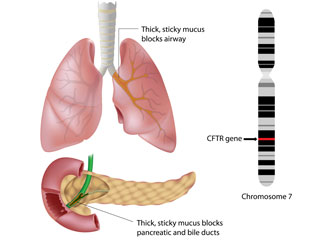Understanding Your Results
Do you carry a mutation in the CFTR gene?

Find out if you are at risk - get tested
| Test Type | Testing Time | Fee |
All orders received before 3pm PST / 6pm EST are shipped out the same business day. All orders received after 3pm PST / 6pm EST or on weekends or holidays are shipped out the following business day. 24/7 online status check and account management available for all tests.
Cystic fibrosis has a high carrier frequency of approximately 1 in 25 Caucasians worldwide. This simple DNA analysis will determine if an individual carries one of the 39 most common mutations in the CFTR gene. If two asymptomatic carriers have a child, there is a 25% chance that the child will inherit two defective CFTR genes and suffer from cystic fibrosis. It is important to remember that an affected child does not need to inherit two copies of the same mutation to be affected. Several hundred disease-causing mutations have been identified in the CFTR gene. Some mutations have a more severe affect on the function of the regulator than others, explaining the variation in disease severity for cystic fibrosis.
Possible Outcomes
Normal A normal result means that the person has tested negative for all 39 CFTR mutations analyzed in this panel. This person will not pass a defective CFTR gene, carrying one of these 39 mutations, to the next generation.
Carrier A carrier is an individual who has inherited one defective CFTR gene and one normal wild type CFTR gene. Carriers have a 50% chance of passing the defective gene to future generations but will not develop the disease themselves. If two carriers have children, there is a 25% chance that their children will be normal, a 50% chance that their children will also be carriers, and a 25% chance that their children will inherit two defective genes and be affected by cystic fibrosis.
Affected An affected individual is one who has inherited two copies of the defective CFTR gene, one defective gene from each parent. People who have two defective CFTR genes will suffer from the symptoms of cystic fibrosis. There is a 100% chance that an affected individual will pass the defective CFTR gene to their children.
